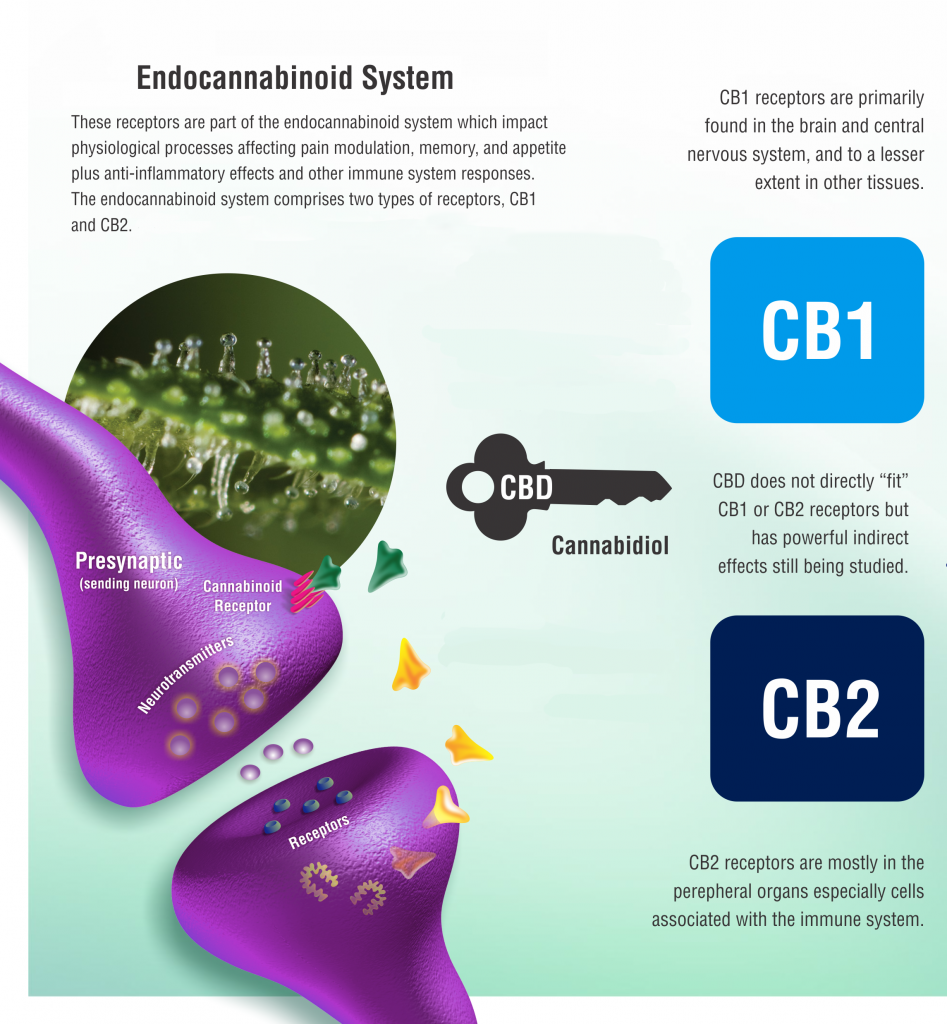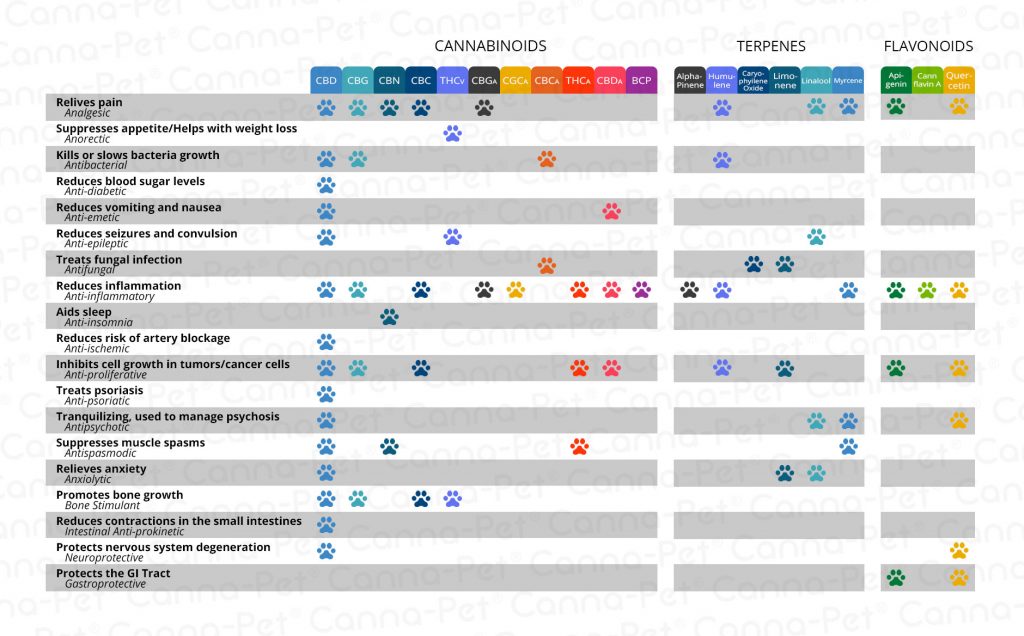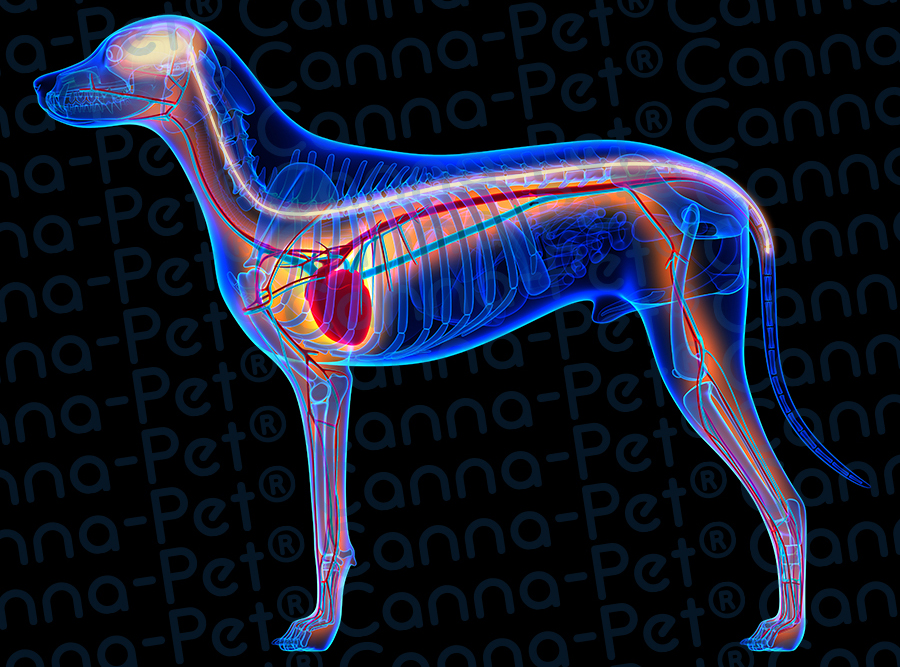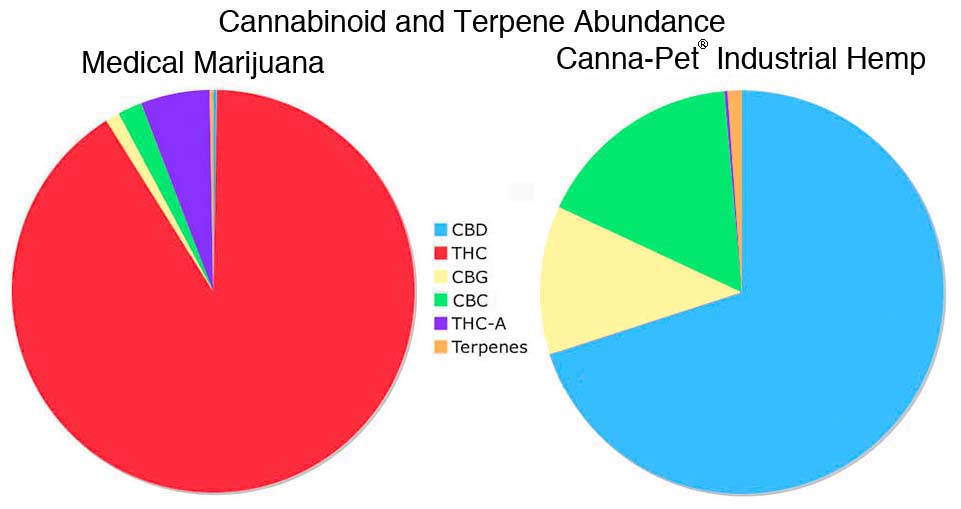Phytochemistry & Compounds
The ECS
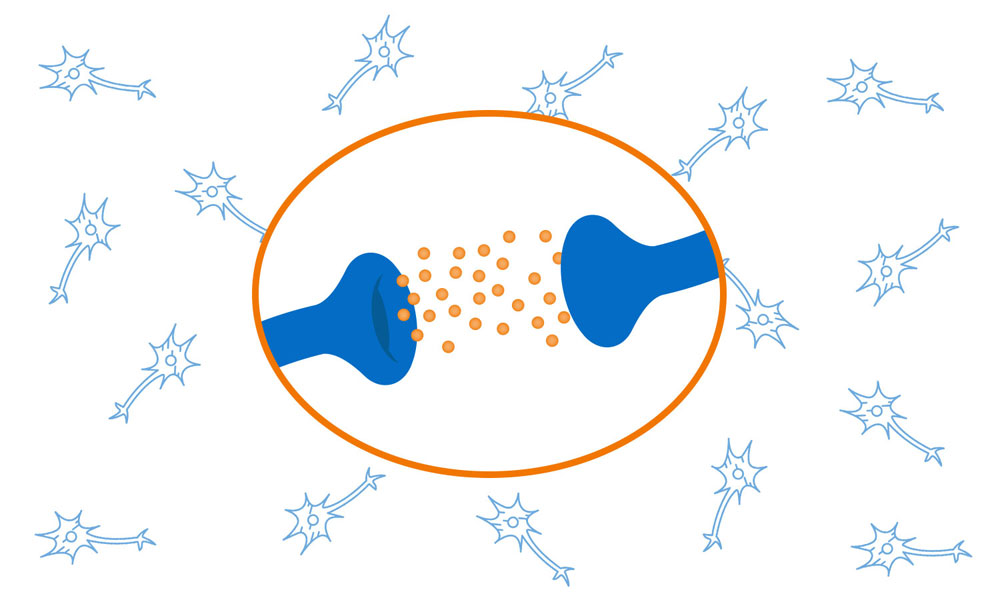
All mammals have a biological and neurological system specifically tasked to receive and process nutritional cannabinoids. The endocannabinoid system (ECS) is involved in a variety of physiological processes including appetite, pain-sensation, nausea, mood, memory, and inflammation.
Cannabinoids (like hemp) are naturally occurring compounds present in trace amounts in several plants, most notably (though not exclusively) in cannabis. Cannabinoids have been cultivated for thousands of years, in part because they uniquely interact with the ECS. For more information on the ECS see this article.
Cannabinoid receptors (there are two primary types CB1 & CB2) exist throughout the body and brain of your pet.
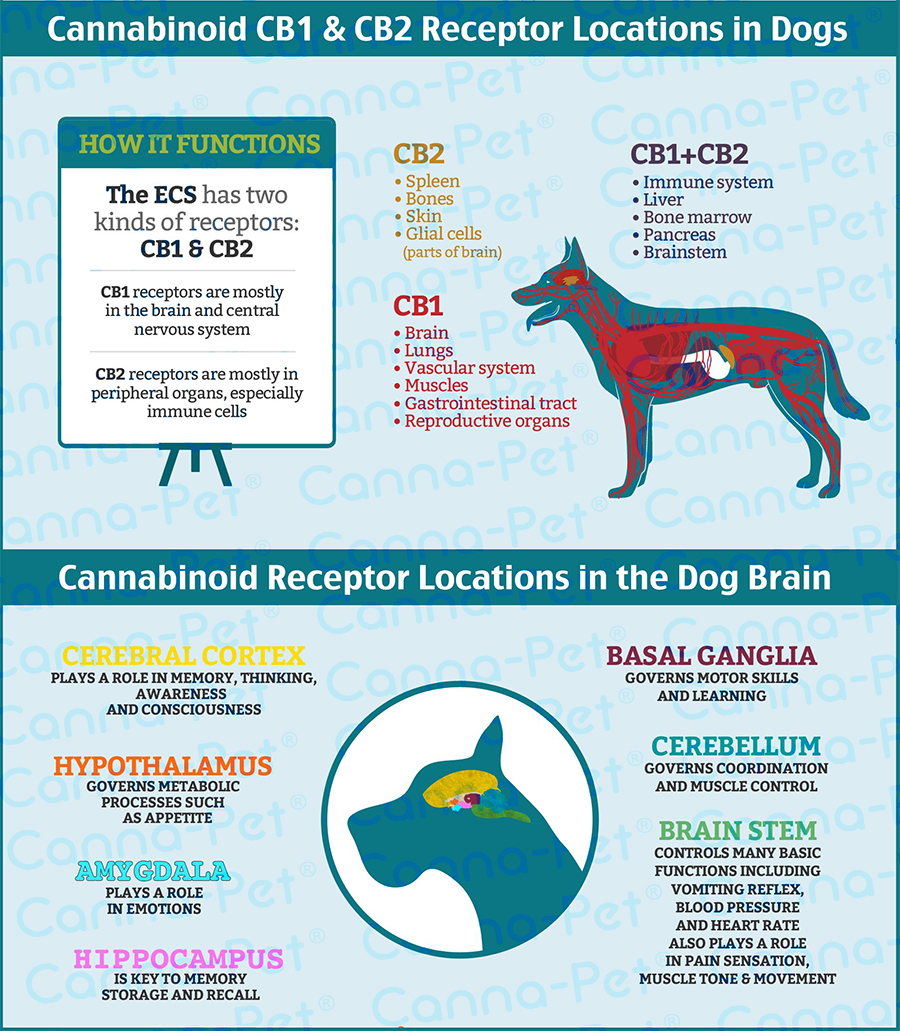
Scientific study on the effects of isolated non-psychoactive cannabinoids and terpenes on animals is documented back to the 1980s.
Trends in Pharmacological Sciences printed a survey article in 2009, Non-psychotropic plant cannabinoids: new therapeutic opportunities from an ancient herb, by AA Izzo.
That article surveys 76 published scientific reports from 1980-2009 to generate the above chart of pharmacological actions of non-psychotropic cannabinoids.
The tremendous potential for these phytochemicals has long been apparent, provided they could be isolated from plants other than marijuana, and formulated from whole plant extracts rather than in isolation.
Canna-Pet® = Cannabinoid Nutrition Adapted for Pets
In 2013 Canna-Pet® became the first company in the world to release products formulated specifically for pets made with non-GMO organic hemp extracts and containing multiple cannabinoids and terpenes like CBD, CBC, CBG, ß-Caryophyllene, myrcene, and pinene. We chose industrial hemp for these products because it is an abundant source of cannabinoids, it has been used in food products for decades, and it is an emerging American agricultural crop.
Canna-Pet® products are unique due to our specialized lab facilities and proprietary extraction methods, which ensure consistent formulations, abundant in phytocannabinoids, terpenes, and flavonoids – all in our proprietary ratios.
With vast amounts of data to draw upon from independent surveys, ongoing clinical research underway at several veterinary universities, and our in-house phytochemical research efforts, we continue to refine and evolve Canna-Pet® products daily.
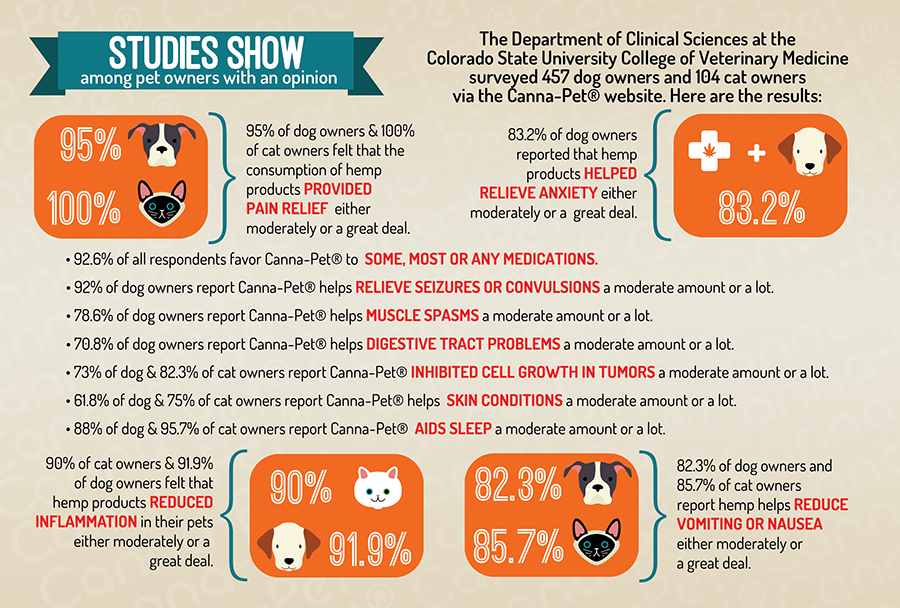
Canna-Pet® is unique in that our CBD extracts are not only made from actual industrial hemp, but also contain eight additional cannabinoids and over twenty terpenes beyond “just CBD.” For example ß-Caryophyllene (BCP) is a dietary cannabinoid included in our products, Not only does this deliver an entirely new potential cannabinoid benefits to the endocannabinoid system (ECS), but it also increases the uptake of CBDs by the system. The same could potentially be said for each of the dozens of additional cannabinoids and terpenes which Canna-Pet® alone provides.
Our Advanced formulations now offer 10-15X the bioavailability of any other pet product.
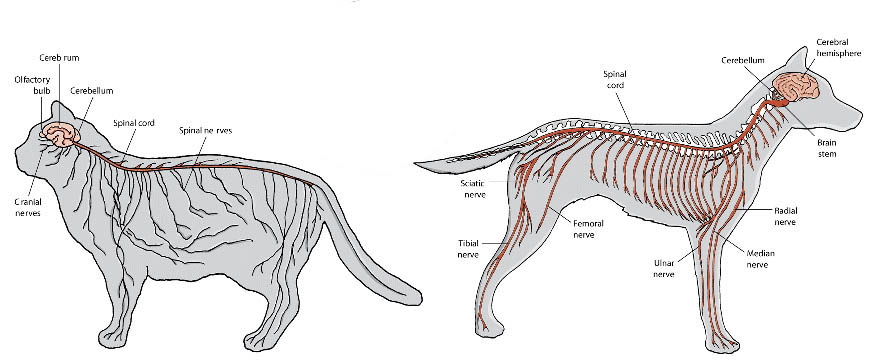
Since 2013 we have produced and delivered millions of cannabinoid products to an enthusiastic global audience. Our products are recommended and sold by veterinarians, covered by major insurers like Petplan and Trupanion, and in clinical trials at prominent veterinary universities.
In the end, it is about results, and that is why over 95% of those who try our products permanently incorporate Canna-Pet® into their pet’s diet.
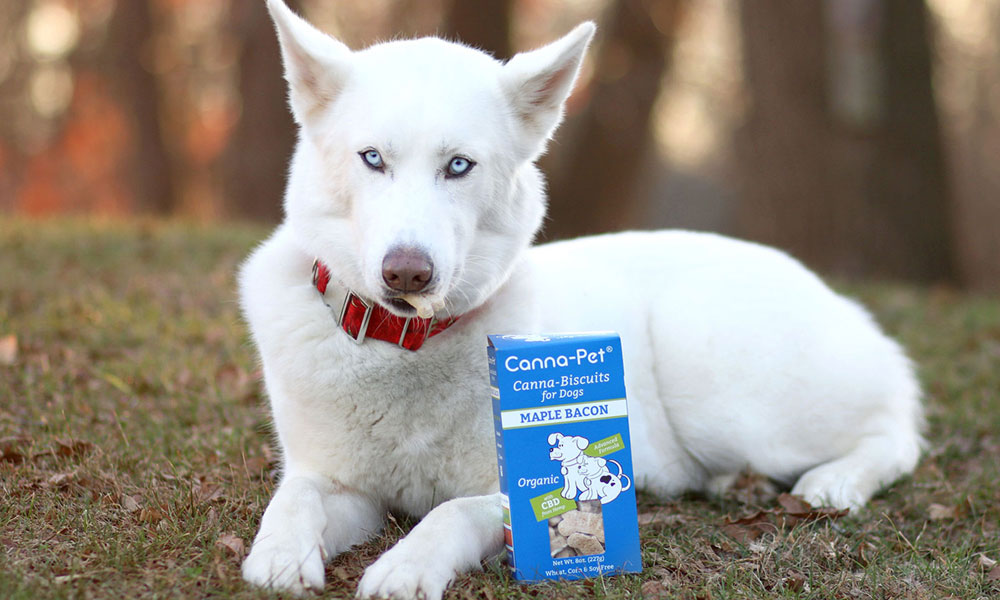
What Actually Matters When it Comes to CBD for Pets
Just looking at milligrams of CBD is NOT going to bring you results like Canna-Pet®.
The efficacy of cannabinoid products is a function of several factors in combination:
- the quality of the extractions used;
- specific diversity of cannabinoids and terpenes in the formulation (Entourage Effect);
- bioavailability of the end product;
Of course Canna-Pet® starts out with more CBDs than any other pet product, but what is truly unique is our phytochemical diversity (Entourage Effect) and bioavailability are MUCH HIGHER than any other product.
Cannabinoid & Terpene Extraction
CO2 extraction is a process that uses pressurized carbon dioxide to pull the desired phytochemicals (such as CBD) from a plant. CO2 at certain temperatures and pressures acts like a solvent, without the dangers of actually being one. It is the most expensive extraction method, and is widely considered the most effective and safest plant extraction method in the world.
CO2 extraction is already a standard extraction method for the food and herbal supplement industries. It is a common food additive as well.
In fact, CO2 is used to produce carbonated soft drinks, in the removal of caffeine from coffee beans in order to make decaffeinated coffee, and as an extraction solvent when producing essential oils.
Most often we hear about supercritical CO2 extractions, but that’s actually only one method of CO2 extraction. There are also subcritical CO2 extractions, and ‘mid-critical’, a general range between subcritical and supercritical.
Subcritical (low temp, low pressure) CO2 extractions take more time and produce smaller yields than supercritical, but they retain the essential oils, terpenes, and other sensitive chemicals within the plant. Supercritical, on the other hand, is a high pressure and high temperature process that damages most terpenes and heat sensitive chemicals, but can extract much larger molecules such as lipids (omega 3 and 6), chlorophyll, and waxes.
Truly full-spectrum CO2 extracts (exclusively used by Canna-Pet®) include first performing a subcritical extraction, separating the extracted oil, then extracting the same plant material using supercritical pressure, and finally homogenizing both oil extracts into one.
In the essential oil industry, an extract made using this specific process is referred to as a CO2 Total Extract.
Our exclusive use of whole-plant, full-spectrum CO2 total extracts enhances the Canna-Pet® Entourage Effect.
The Canna-Pet® Entourage Effect

Canna-Pet® exclusively uses whole-plant CO2 total extracts, and our products contain over two dozen cannabinoids, terpenes and flavonoids, including CBD, ß-Caryophyllene, CBC, CBG, limonene, α-pinene, and linalool. Every product batch is HPLC tested to ensure quality and consistency. Rather than focusing on hemp alone, we deliver the widest possible array of phytochemicals – formulated to produce the Canna-Pet® Entourage Effect. The phrase was popularized by EB Russo in 2011.
Not only do our products have the highest CBD levels and concentrations of any pet products (by a factor of 5-26X, according to the FDA in 2015), but they also contain dozens of other beneficial compounds from hemp that are not present in other products – promoting a substantially more pronounced Entourage Effect.
 Read what Dr. Sanjay Gupta has to say about the Entourage Effect.
Read what Dr. Sanjay Gupta has to say about the Entourage Effect.
Canna-Pet® is the only cannabinoid nutrition company in the world that:
- offers veterinarian recommend, safe products that are covered by major pet insurers;
- uses exclusively organic, non-GMO hemp;
- provides precisely formulated ratios of numerous cannabinoids;
- uses a gentle, proprietary refinement process in our laboratories;
- delivers a cGMP product with unique abundance and variety of phytochemicals;
- delivers 10-15X the bioavailability of other hemp products;
- provides a money back satisfaction guarantee.
All products are developed exclusively by Canna-Pet® in our US-based laboratories. Our raw materials and end-products are repeatedly HPLC tested to ensure quality and consistency in all stages of production.
Cannabinoid Bioavailability & Absorption
When traditional foods, supplements or treats digest in the stomach:
Also known as the hepatic first pass effect – any product absorbed from the gastrointestinal tract is first delivered to the liver by the portal vein. A fraction of the product can be metabolized in the gastrointestinal tract or liver before it even reaches the systemic circulation. Therefore the oral bioavailability of the cannabinoids and terpenes are reduced.
CBD undergoes a substantial first pass effect as your pet digests hemp. The GI tract and liver break down the CBD to metabolites, most notably 7-hydroxy-CBD and CBD-7-oic acid.
See Pharmacokinetcs of Cannabidiol in Dogs:
The results of this study show that CBD is barely absorbed after oral administration to dogs. This low bioavailability may be due to a first pass effect.
This means the bioavailabilty of many cannabinoids and terpenes when ingested is much lower than when absorbed via the oral mucosa (in the mouth).
Canna-Pet® : Maximum Bioavailability & Absorption
Canna-Pet® Advanced & MaxCBD Products:
Our powders and liquids are specifically designed to readily dissolve in the mouth, rather than digest in the GI.
This provides Canna-Pet® products significantly (10-15X) higher bioavailability.
Terpenes and Cannabinoids in Nature
Terpenes have been designated “generally recognized as safe” (GRAS) by the US Food and Drug Administration.
ß-Caryophyllene is a dietary cannabinoid that is abundant in the food supply and is an FDA-approved food additive.
You can find studies on many individual terpenes like linalool & limonene and on cannabinoids like CBD & ß-Caryophyllene on our Research page.
Flavonoids
Flavonoids (including resveratrol, quercetin, and catechin) are natural products widely distributed in the vegetable kingdom.
You can find studies on flavonoids on our Research page.
Cannabinoids Beyond the Cannabis Plant
The endogenous cannabinoid system (endocannabinoid system) is an integral part of mammalian physiology, discovered in the mid-1990s by Israeli researcher Dr. Raphael Mechoulam, and named after the plant that led to its discovery – Cannabis sativa. For nearly twenty years it was assumed that cannabinoids only originated in the cannabis plant. Then, in 2008, a radical change occurred when it was revealed that Beta-caryophyllene is a dietary cannabinoid. Within a few years it was discovered that cannabinoids are present in many other common plants, and have long been a component of the global food supply.
Non-psychoactive cannabinoids are naturally present in plants like basil, broccoli, carrots, cauliflower, echinacea, flax, green tea, oregano, pepper, rosemary, and many others.
Cannabinoids may seem subjectively new to scientific study in isolation, but they are an ancient component of the global food supply.
Source: Phytocannabinoids beyond the Cannabis plant – do they exist?, Jürg Gertsch, Roger G Pertwee, and Vincenzo Di Marzo, British Journal of Pharmacology, June 2010, © 2010 The British Pharmacological Society.
Beta-Caryophyllene – The Dietary Cannabinoid
ß-Caryophyllene (BCP) is found in a variety of plants, including rosemary, basil, cloves, and, of course, cannabis. It’s also highly present in black pepper.
While BCP was first synthesized in 1964, it wasn’t until 2008 that a group of German and Swiss scientists, led by Andreas Zimmer, PhD and Ildiko Racz, PhD of the University of Bonn, discovered that ß-Caryophyllene is a dietary cannabinoid. Writing in the journal Proceedings of the National Academy of Sciences (PNAS), they summarized:“Here, we report that the widespread plant volatile β-Caryophyllene (BCP) selectively binds to the CB2 receptor and that it is a functional CB2 agonist. Intriguingly, BCP is a common constituent of the essential oils of numerous spice and food plants and a major component in Cannabis.”
This was a revolutionary discovery – ß-Caryophyllene was the first “dietary cannabinoid” – that is, widespread in the traditional food system, present in several GRAS plants, and already an FDA-approved food additive. It is also seen as a powerful, natural anti-inflammatory – as explained by National Geographic Magazine.
Now we know why mom says “eat your veggies!”
Source: Beta-caryophyllene is a dietary cannabinoid, Jürg Gertsch, Marco Leonti,Stefan Raduner, Ildiko Racz, Jian-Zhong Chen,‖ Xiang-Qun Xie,‖ Karl-Heinz Altmann, Meliha Karsak, and Andreas Zimmer, Proceedings of the National Academy of Sciences, July 2008, Copyright © 2008 by The National Academy of Sciences of the USA.
Just the Flax Ma’am
Flax is a food and fiber crop that is traditionally grown in cooler regions of the world, including many states in the USA. It has been part of the global food supply and in fed to animals for thousands of years.

Flax (Linum usitatissimum) has long been known to be a natural source of lignans (antioxidants) and omega-3 fatty acids (ALA). Flaxseed and its oil have repeatedly been demonstrated to be non-toxic and are generally recognized as safe for consumption (GRAS).
Flax as a Source of CBD
There was an amazing discovery made by European scientists in 2011- flax contains cannabinoids, specifically cannabidiol (CBD), which can be extracted for potential nutraceutical applications. Researchers found that the biological activity of the CBD preparation from flax was the same as the pure compound isolated from C. sativa. (Styrczewska, p.496)
“The existence, nature, biosynthesis pathway and activity of cannabinoids in flax requires much further investigation, but the discovered compounds give great new possibilities for flax product applications…”(Czemplik pp. 427-428).
Just as Canna-Pet® innovated the hemp-based cannabinoid industry for pets in 2013, we are now harnessing the phytochemical potential of flax as a nutraceutical.
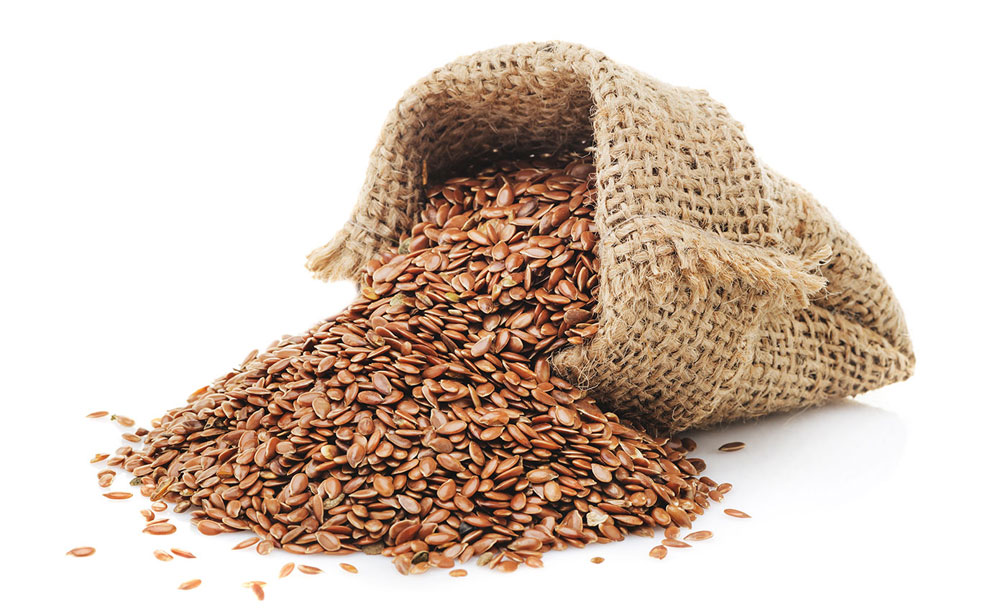
Sources:
Flax Engineering for Biomedical Application, Magdalena Czemplik, Aleksandra Boba, Kamil Kostyn, Anna Kulma, Agnieszka Mituła, Monika Sztajnert, Magdalena Wróbel- Kwiatkowska, Magdalena Żuk, Jan Szopa and Katarzyna Skórkowska- Telichowska, “Biomedical Engineering, Trends, Research and Technologies”, book edited by Malgorzata Anna Komorowska and Sylwia Olsztynska-Janus, ISBN 978-953-307-514-3, Published: January 8, 2011.
Cannabinoid-like compounds from flax fiber, Monika Styrczewska, Anna Kulma , Katarzyna Ratajczak, Ryszard Amarowicz, Jan Szopa, Cellular and Molecular Biology Letters, September 2012, Copyright © 2012 Cellular & Molecular Biology Letters Journal.
What makes Canna-Pet® Unique?
Canna-Pet® hemp, Cannabinoids & Terpenes
Canna-Pet® products contain over two dozen cannabinoids, terpenes and flavonoids, including CBD, ß-Caryophyllene, CBC, CBG, limonene, α-pinene, and linalool. Every product batch is HPLC tested to ensure quality and consistency. Rather than focusing on CBD alone, our products deliver the widest possible array of phytochemicals – formulated to produce the Canna-Pet® Entourage Effect.
Canna-Pet® products are lab refined, analyzed and tested, cGMP produced, veterinarian recommended, pure & safe.
Canna-Pet® is the only cannabinoid nutrition company in the world that:
- offers veterinarian-recommend, safe products that are covered by major pet insurers;
- uses exclusively organic, non-GMO hemp;
- provides precisely formulated ratios of over 25 cannabinoids and terpenes;
- uses a gentle, proprietary refinement process in our USA laboratories;
- delivers a cGMP product with unique abundance and variety of phytochemicals;
- provides a complete satisfaction guarantee.
Legal Status of CBD Hemp
The United States Court of Appeal for the Ninth Circuit in Hemp Industries Assn., v. Drug Enforcement Admin., 357 F.3d 1012 (9th Cir. 2004), recognized that “non-psychoactive hemp [that] is derived from the ‘mature stalks’ or is ‘oil and cake made from the seeds’ of the Cannabis plant, …fits within the plainly stated exception to the CSA definition of marijuana.” Id. at 1017.
Industrial hemp is legal to import under the Controlled Substances Act (CSA). Since 1937, the federal statute controlling marijuana has excluded the stalk, fiber, oil, and sterilized seed of the plant Cannabis sativa L., commonly known as hemp, from the definition of “marijuana.”

Why is Canna-Pet® Hemp Superior to “Medical Cannabis”
HPLC analysis of “medical marijuana” or “medical cannabis” available at a dispensary today would reveal a chemical profile which is highly skewed towards the psychoactive THC, and away from other cannabinoids. This is the expected result of thousands of generations of selective breeding, primarily on the basis of increasing THC content. Even in low concentrations, THC can cause serious side effects for animals, and for this reason marijuana-based products are poorly suited for pets.
In comparison, an analysis of the extractions produced by Canna-Pet® from industrial hemp would reveal a completely different phytochemical profile – rich in CBD, other cannabinoids and terpenes, but devoid of THC.
Simply put – Canna-Pet® discovered superior plant sources for phytochemicals, and developed advanced techniques to extract and retain the volatile constituents of those plants in our products.
The primary reason Canna-Pet® extracts are superior is because of the unique abundance of cannabinoids and terpenes we provide, tailored specifically to address to the requirements of dogs and cats – all without the possibility of side effects from psychoactivity.
Our products feature uniquely high levels of safe, legal cannabinoids and terpenes, which we then formulate to have 10-15X the bioavailability of traditional CBD products.
Our non-GMO, plant-based ingredients are all sourced from respected suppliers, refined in laboratories in the USA, and produced in cGMP facilities.

